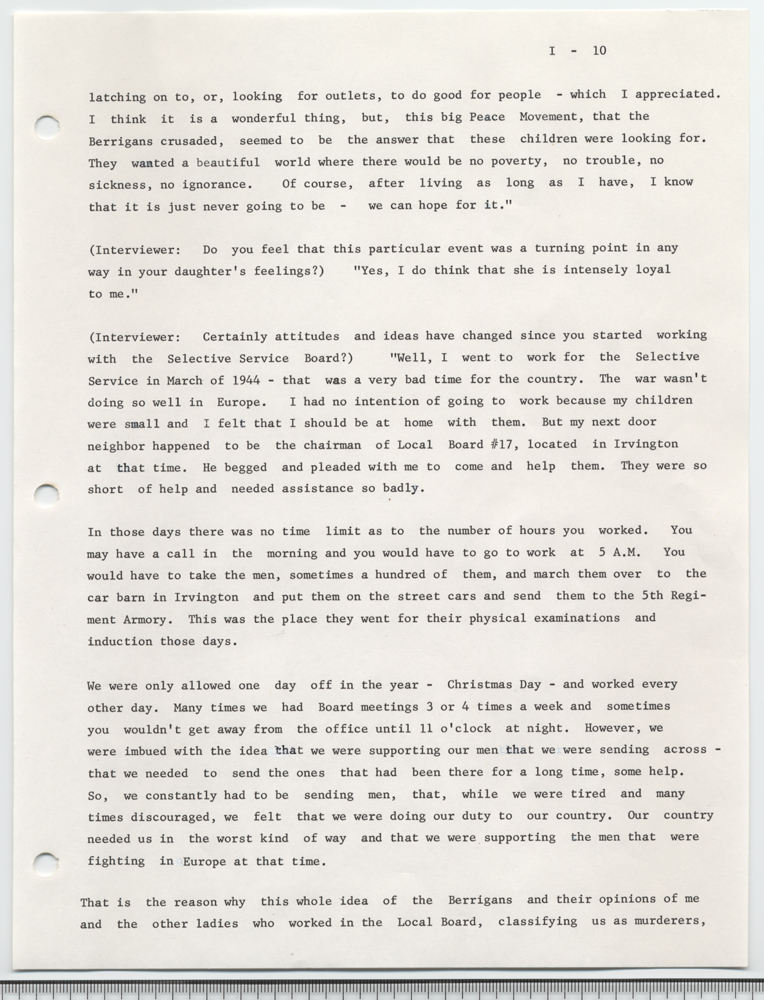 |
Burning of draft board records by Philip and Daniel Berrigan and others, May 17, 1968: an interview with Mary E. Murphy given on November 2, 1972
 |
12 / 15 |
 |



| Collection: |
Friends of Catonsville Library |
| Date: |
1972-11-02 |
| Date of Digitization: |
2004-03-29 |
| Source: |
Catonsville Library |
| Original Dimensions: |
28 x 22 cm |
| Creator: |
Murphy, Mary E. |
|
|
Notes:
This a transcript of a recorded interview with Mrs. Mary E. Murphy who was the Chief Clerk at the Draft Board office no. 33 at the time of the event of the forceful removing and burning of the draft cards by the Catonsville Nine group.
Transcription: latching on to, or, looking for outlets, to do good for people - which I appreciated,
I think it is a wonderful thing, but, this big Peace Movement, that the
Berrigans crusaded, seemed to be the answer that these children were looking for.
They wanted a beautiful world where there would be no poverty, no trouble, no
sickness, no ignorance. Of course, after living as long as I have, I know
that it is just never going to be - we can hope for it."
(Interviewer: Do you feel that this particular event was a turning point in any
way in your daughter's feelings?) "Yes, I do think that she is intensely loyal
to me."
(Interviewer: Certainly attitudes and ideas have changed since you started working
with the Selective Service Board?)"Well, I went to work for the Selective
Service in March of 1944 - that was a very bad time for the country. The war wasn't
doing so well in Europe. I had no intention of going to work because my children
were small and I felt that I should be at home with them. But my next door
neighbor happened to be the chairman of Local Board #17, located in Irvington
at that time. He begged and pleaded with me to come and help them. They were so
short of help and needed assistance so badly.
In those days there was no time limit as to the number of hours you worked. You
may have a call in the morning and you would have to go to work at 5 A.M. You
would have to take the men, sometimes a hundred of them, and march them over to the
car barn in Irvington and put them on the street cars and send them to the 5th Regi-
ment Armory. This was the place they went for their physical examinations and
induction those days.
We were only allowed one day off in the year - Christmas Day - and worked every
other day. Many times we had Board meetings 3 or 4 times a week and sometimes
you wouldn't get away from the office until 11 o'clock at night. However, we
were imbued with the idea that we were supporting our men that we were sending across -
that we needed to send the ones that had been there for a long time, some help.
So, we constantly had to be sending men, that, while we were tired and many
times discouraged, we felt that we were doing our duty to our country. Our country
needed us in the worst kind of way and that we were supporting the men that were
fighting in Europe at that time.
That is the reason why this whole idea of the Berrigans and their opinions of me
and the other ladies who worked in the Local Board, classifying us as murderers,
|




